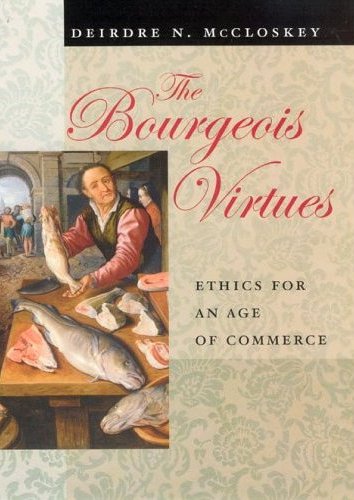Reprising this from when I read Deirdre McCloskey’s fascinating, intriguing, and wonderfully learned The Bourgeois Virtues: Ethics for an Age of Commerce (University of Chicago Press, 2006). Early on McCloskey cites three statistics about progress between 1800 and now:

Wealth: “The amount of goods and services produced and consumed by the average person on the planet has risen since 1800 by a factor of about eight and a half” (p. 16). The items consumed include more and better food, cleaner water, education, health care, safer technologies, and so on. Consequently:
Life expectancy: Increased wealth “raised the expectation of life at birth in the world from roughly 26 years in 1820 to 66 years in 2000” (p. 18). So if one is an adult by, say, age 16, the average amount of adult life rose from 10 years in 1820 to 50 years in 2000 — a factor of 5.
Population: “The world’s population increased from 1800 to 2000 by a factor of about six” (p. 15).
So people have 8.5 times more stuff; they have 5 times as much time to enjoy it; and there are 6 times as many people.
8.5 x 5 x 6 = 255. How’s that for Philosophy-Math? : )
Related: “What Business Ethics Can Learn from Entrepreneurship.”
Moralism has been out of favour in progressive circles for a long time, partly because it was associated with traditional (auhoritarian) religions and partly because many moralists focussed too narrowly on sexual activities. This is unfortunate because a sound moral framework is one of the pillars of classical liberalism, along with a suite of freedoms, property rights and the rule of law.
The moral framework needs to be regarded as a form of social capital (if you like that kind of language) and the same “conservationist” attitude should be adopted towards the moral framework as sensible people adopt towards the natural environment. Strange to see the different stance that left-progressives of the “adversary culture” have towards the natural and the social environment!
Congratulations to Deirdre McClosky for this book, but shame on her for the damage that she did to rationality and the scientific attitude with her exaggerated regard for rhetoric over substance in arguments.
Thoughtful comment, Rafe. About the substance and rhetoric points you raise in your third paragraph: I think that in her heart of hearts Deirdre McCloskey is a woman of the late eighteenth century. On the substance side, she is updating Adam Smith, David Hume, and Benjamin Franklin. On the rhetoric side, she loves the era’s leisured elegance of language and the epistolic novelist’s personal style. So can you say more about what you call her “exaggerated regard for rhetoric over substance.” Do you think that her substance is fine but the rhetoric is overblown, or is it that her rhetoric masks a lack of substance?
I am distracted by a number of things, notably a recent death in the family, and cannot come up with the piece by McClosky that aroused my ire. Maybe this crit by Rothbard can stand in for the moment http://mises.org/journals/rae/pdf/RAE9_1_11.pdf
It is clearly possible to be more or less charitable in reading McClosky on rhetoric and it seems that Rothbard has taken the uncharitable route!